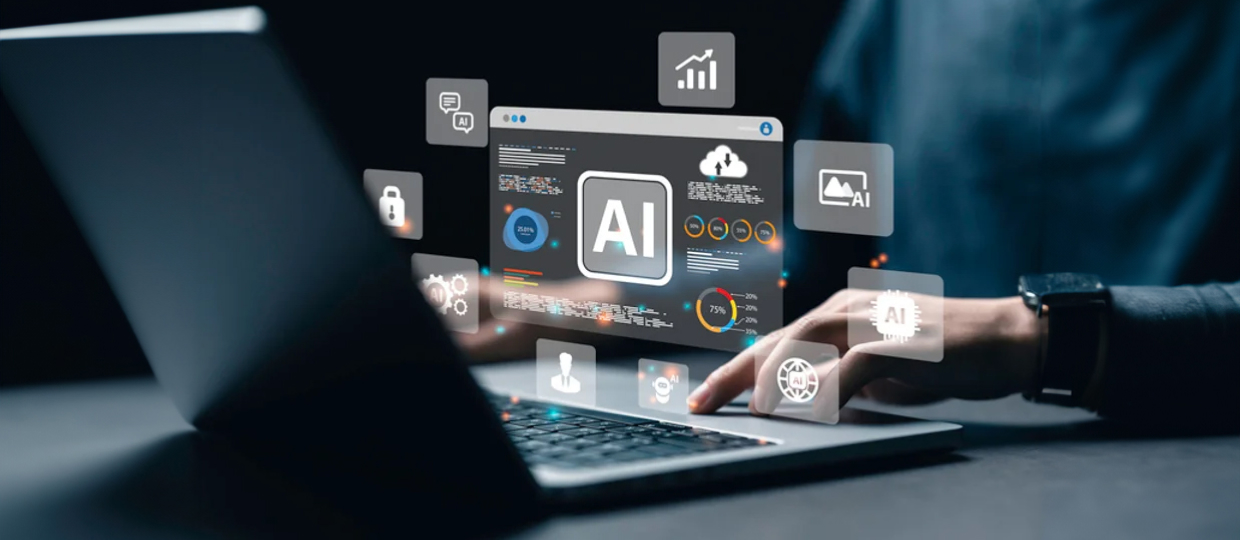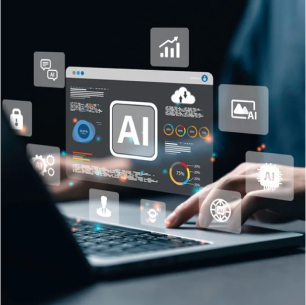AI Roundtable: How our team is preparing for the next marketing era


Q: From where you’re sitting, what is the future of AI in communications, marketing and design?
Ryan: Right now, there is a lot of noise. A flood of AI discourse has been crossing my news feed lately. If you ask Elon Musk, AI will become smarter than humans within the next year. But if you ask me, I don’t think it will be smart enough to do our jobs anytime soon. It still needs to be fed data to be able to create anything, and human ingenuity is still required. I’m not convinced that a total “revolution” is going to happen as soon as everyone thinks it is.
Louis: That’s true, adoption takes time. And I agree that while AI is going to make us more efficient as creatives, it’s not going to replace the need for humans. If you use a tool like Microsoft Copilot, for example, it can analyze a document for you and generate a ten-point bulleted summary in seconds. When it comes to planning and executing a marketing strategy, much of that process is either already automated or going to be automated in the future. But with anything AI-generated, it can only get you so far. The rest requires human oversight. In the short term it will give us more efficiency. It’s the long-term impact that’s hard for me to predict.
Matt: In the long term it’s going to affect everything we do… and we have no clue what’s about to come. I believe it’s going to make decent designers better designers, and great designers into amazing designers. Every company will have their own models that are trained with their specific brand voice. It will be able to do all the redundant jobs nobody wants to do. Marketers can feed it customer personas, and it will be able to tailor hyper-localized deliverables to those customers. It will be the voice of your customer and the voice of your brand. And it’s going to think of things we can’t even comprehend.
Louis: But is the quality of AI output there yet? Is it accurate?
Matt: … It’s almost there. There are still some bugs. But it’s the worst it will ever be. Soon we might not be able to tell the difference.
Logan: A trained eye can tell when something is designed with AI, and LLMs can hallucinate information. I don’t think it’s there yet.
Q: What is your personal experience with AI and how does it influence your outlook?
Ryan: When it comes to video, I’m always open to using new tools that make us more efficient. I’ve seen people take videos where the subject is speaking English, put it through an AI translator, and suddenly they are speaking Spanish in no time flat. So, I think just like other revolutions in technology — the industrial revolution, for example — people still had jobs afterwards, those jobs just looked different from before.
Matt: I use OpenAI’s ChatGPT most often, and I encourage my writers to use it as well. It’s great for generating ideas, creating thought starters and getting away from a blank page, where a lot of people get stuck. And then once you start playing with it and iterating with it, you quickly understand where it’s helpful vs. where a human needs to take over.
Logan: As a designer, I haven’t found a good use for it yet. I have tried to, but the results weren’t usable. Automatic image cutout? Ok sure, I’ve used that. But for full design use cases, I’m not using it any time soon. The level of design we’re doing for our clients still needs a human touch. Even as far as producing a simple image goes, the quality just isn’t there. I’m never going to rely on a model to do something without extensive oversight.
Louis: Never say never. Humans, by nature, look for easier ways to accomplish anything; look at fitness and weight loss for example. There’s a reason there are so many gimmicks out there. If it makes our lives easier, then why not? Although yes, there are nuances with our highly technical clients that AI doesn’t quite capture yet.
Matt: Yet. I think it will only get better with time.
Louis: I have mainly used AI for personal projects, like brainstorming and writing first drafts of blogs. I think it has done a great job, and if you aren’t happy with the initial output, it can always iterate new and incrementally better content. But I am worried about its ethicality and legality. It can only aggregate information from many sources that may or may not be reliable.
Logan: Right. These models are pulling from anything and everything — there is no fact-checking. If it accidentally picks up misinformation, there is no way to source it.
Matt: Yes, but I think the blog content world is going away altogether. People are becoming increasingly interested in learning from authentic sources — video being one of them.
Ryan: What about Deepfakes and bots impersonating humans?
Matt: With that, it’s going to take a lot of trust in real experts. Authentic and owned sources (like business websites or X/Twitter profiles) will stand out.
Louis: That’s why I say we are our own worst enemy. We can use AI for these things, but does that mean we should? Trust is a big deal. If the public knows that a company is generating AI content, the consumer may raise a brow.
Logan: Authenticity will only become more important as this stuff develops. People will value authenticity more than they already do.
Q: What are some best practices when it comes to embracing or resisting the shift to AI?
Louis: For business leaders, I would say lead with caution. Evaluate how your business would realistically use it from a cost perspective. These new technologies aren’t cheap. Yes, they save time, but is it more cost effective than human capital? Remember, you can’t solely rely on AI — you need a human to verify it at least before you put it out into the world. It may save you time on writing a first draft, but you’re still going to have to put in time for fact-checking. These are all important considerations. But above all, it’s important to be transparent as to whether you’re using it.
Logan: Yes, the optics right now aren’t good. But as long as you’re open about your use of AI, transparency may help you maintain trust with your audience.
Matt: For creatives, my advice is to embrace change and find ways for AI to make your work life more efficient and effective. Your time and your client’s budgets are valuable. When you invest in AI tools, you’re paying for your time back as much as the service. Think of AI as a second you; use it to remove any mundane, repetitive, and mind-numbing aspects of your day, so you can spend more time being artistic, strategic and working on the truly enjoyable aspects of your job you would rather be doing. Be open to dreaming about what it might do in the future — how you could train it to think like you, write like your brand/company, understand your audience. Then, notice how it tailors content to different personas, so you can get to know your audience faster… In some future world, we might not even need to work 40-hour weeks anymore.
Ryan: That would be ideal, but the easier things become, the volume of content will only increase, and the number of hours we work will stay the same. It’s likely that people will just be asked to do more with less, if they aren’t already doing so. Companies would need to be intentional about putting people before profit.
Louis: In the same way that every corporation must publish their stance on sustainability, I think every company will be called on to publicly share their stance on AI. Establishing a standard of ethics and best practices around AI is the next wave in corporate responsibility.
Logan: There is something to be said about AI as a trend. And when everything starts being produced by AI, people will naturally get bored with it, and the pendulum will swing in the other direction. I’m already seeing younger generations pushing back, going analogue again. They’re saying things like, “I want a dumb phone”. Film cameras are exploding right now. People just crave authenticity and trust. At the end of the day, people will always want those things.
Matt: I don’t know what the future is, but no matter what your feelings are around AI, it would be wise to at least be curious about it. There’s a great chart I saw recently where perception of AI ebbs and flows between “It’s magic”, to “It’s stupid”, to “It’s downright evil and will take my job” … but with time it goes right back to “It’s magic”. Our job is to pay attention and do our best to keep up with what’s coming.




